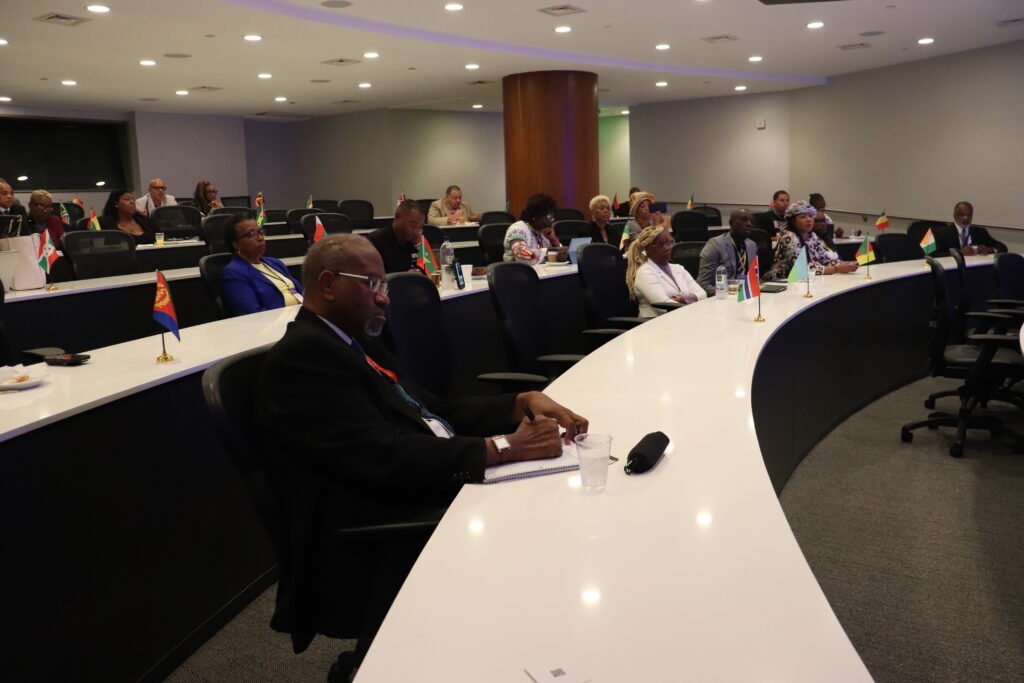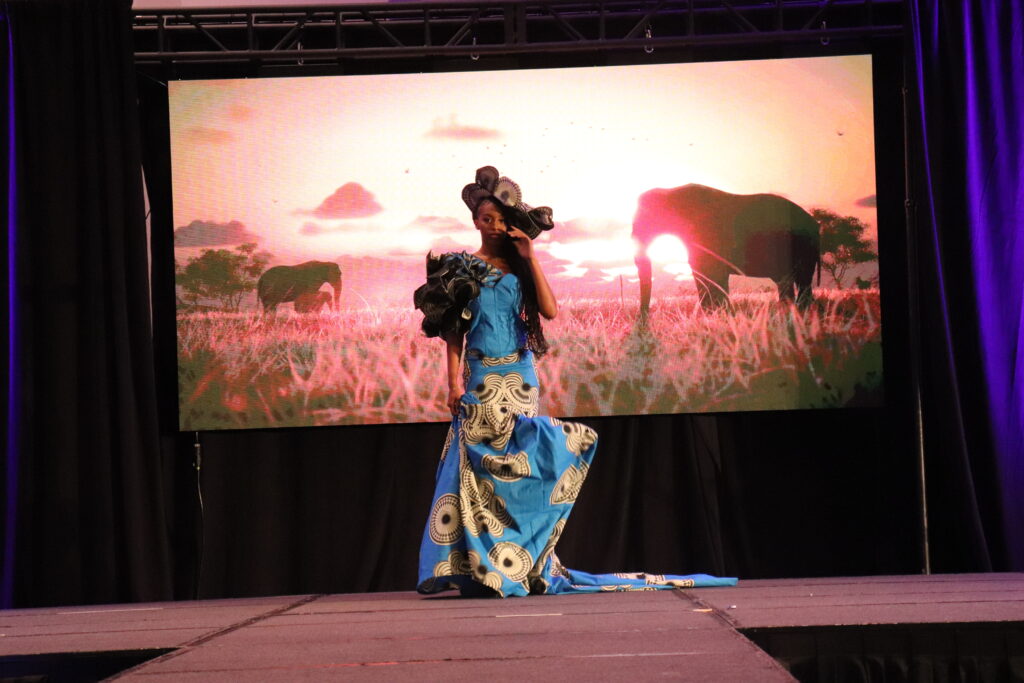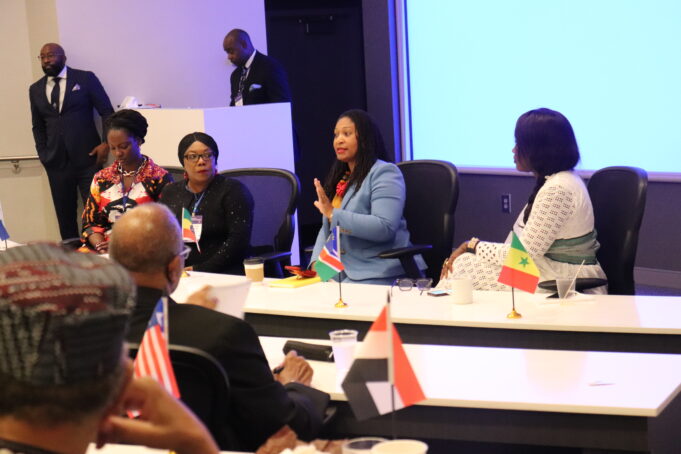ATLANTA— Bridging the gaps between the African continent and the coast-to-coast diaspora was a big discussion point at the National Black Business Conference, which recently took place.
The conference, hosted by the National Business League, the National Black Chamber of Commerce and The World Conference of Mayors, welcomed African representatives from all over the continent. Present were the Minister of IT (Information Technology) from Senegal, a special envoy from Uganda, the Ministry of Tourism from Kenya, Invest Barbados and representatives from Gambia, the Ivory Coast, Mali, Tanzania, Ghana and other countries.
The conference was held August 24-26 at the Hyatt Regency Atlanta.
The keynote speaker at the conference’s opening ceremony, Joy Basu, serves as Deputy Assistant Secretary of State in the Bureau of African Affairs. She voiced her belief that the future depends on Africa, as in a few short decades, one in four people in the world will be African.
Dr. Tyrene Wright of City University of New York (CUNY) followed behind in the “Re-Building Black Wallstreet Panel,” saying how Africa is the seat of Black power and liberation. She gave the audience a history lesson on how Booker T. Washington was a key planner and promoter of the first pan-African conference that took place in 1900.
“Unity for the purpose of eradicating oppression and exploitation” was the bonding factor during the first pan-African conference, she said.
A “Pan-African Diaspora Global Business” panel took place in the afternoon of Aug. 25. Tammy Maxwell, Acting Senior Vice President of the Office of Small Business at the Export Import Bank of the United States, shared words on how the number one question African presidents ask is, “Where are our Black businesses?”
Many have trouble finding them, she said. Her goal is to connect Black businesses in the U.S. to Africa. She encouraged Black business owners to connect with the bank, so that she can better connect the businesses to African officials. She also advocated for promoting business-to-business linkages between Black businesses in the U.S. and businesses in Africa.
The spirit of diasporan unity was high during the international fashion show that took place later that evening. Conference attendees showed up in their best-dressed African garb. Models were dressed and styled by African designers and stylists.
Business summit
The theme of unity between the continent and the diaspora continued the next day, Aug. 26, with a “Pan-African Diaspora Black Business Summit,” which ran concurrently with the conference’s overall business workshops. The summit was put on by the National Alliance of Black Business (NABB) and presented by Prosper Africa.

The first session was an all-women panel on “Bridging boundaries, igniting prosperity: Discussion on fostering trust and collaboration between the African diaspora and Africa.” Speaking on the relationship between Africa and the diaspora, the women acknowledged, “We are one.”
They went into the challenges facing the diaspora community and the solutions. Challenges included the lack of cultural awareness and cultural competency within the diaspora, both sides not knowing one another and the global systemic issues that promote division.
“Let’s purpose in our mind that our lead thought, our controlling thought … ‘I can work with my sister,’” Rev. Dr. Pamela Fomunung, president and CEO of Africa’s Brain Bank, said. “Once you have that lead thought, it doesn’t matter what they say in the news. It doesn’t matter what some enemy of progress tells you.”
Panelists throughout the summit brought up how many of America’s largest cities are now being run by Black mayors and how historically Black colleges and universities have been at the forefront of engaging the continent.
The prime minister of Barbados and the president of Ghana are “at every chance they get, introducing the question of reparations, introducing the question of Black empowerment in the diaspora,” Deneyse Kirkpatrick, public affairs international executive for Vermerge Global, said.
“Post-George Floyd, the government of Equatorial Guinea took all of their students out of (predominantly White institutions) and put them in HBCUs. Imagine if all the students on the continent who come and study attend HBCUs; imagine what that would do to the economy of Black communities where most HBCUs are located,” she added.
Other points of discussion during the summit included Africa and the diaspora entering the global economy and uncovering the African diaspora’s role in “AGOA,” or the African Growth and Opportunity Act.

Panelists identified the industries of agriculture and medicine as commercial opportunities across Africa. They spoke on the lack of infrastructure in the medical industry and the areas for investment.
Summit panelists largely recognized the work that still has to be done regarding AGOA. “At no point in our history has a U.S. instrument” forged a connection with Africa, Dr. Nkem Khumbah, chairman of Africa’s Brain Bank, said of the act. Instead, he said, the national business alliance should seek direct engagement with the African business community.
An audience member from the Caribbean voiced his concern regarding AGOA. “If you as Africans, you as African Americans do not go and ask for what you want, you won’t get it,” he said.
Panelist Shaq Teasley, CEO and founder of Agate Solutions, introduced the idea of trilateral free trade agreements between the U.S., Africa and the Caribbean and making trade agreements between multiple nations as a strategy on how Black people in America, on the continent and in the Caribbean can benefit from the movement of goods throughout several nations that still support Black businesses.
The last summit panel was on the topic of “Supporting African self-reliance and diasporan independence: positioning NABB (National Alliance of Black Business) as a resource for U.S.-Africa economic relations.”
The number of countries in Africa differ depending on the person asked, but Dr. Dennis Matanda, chief executive of Morgenthau Stirling, Inc., settled on 55. He noted that the forefathers of Africa understood the essence of what it meant to have a United Africa, because they saw how powerful the 50 states of America were. He also challenged previous statements on China as a competitor to the U.S. within Africa.
“China will not beat the United States in Africa, especially because there’s a bigger diaspora in the United States than in China,” he said.
Panelist Samuel Mwali questioned what everybody else sees about Africa that Africans and the diaspora do not see. “Everybody has a plan for Africa except us. China has a plan for Africa. Europe has a plan for Africa,” he said.
He advocated developing business-to-business linkages between Africa and the diaspora by fostering trust and taking advantage of Black business associations. He also mentioned the importance of Black business associations within the U.S. working with their African counterpart associations. He listed trust and confidence as the two most important elements of business.
“The diaspora in the United States and the African businesses got to trust each other, got to have confidence in each other,” he said.
Tuskegee Mayor Johnny Ford, who is the president of The World Conference of Mayors, voiced during the close of one of the sessions that a forum such as the one that took place makes no sense at all if the participants do not come out of it with a unified agenda to take to the president of the United States.
“Do we trust each other enough in the room here to be able to work together?” Efe Ukala, founder of ImapctHer, questioned. “If we want to really get involved, deeply involved in solving the problems in Congo, in solving the problems that we experience in Ethiopia, Nigeria, can you look each other in the face to say, ‘You know what, let’s trust ourselves.”
“All of this talk is all talk until we can do that, because no one person in this room is a single solution to Africa’s problems,” she added.
A Kenyan attendee who does business advisory services between Kenya and the U.S. recommended the creation of a communication hub. “When I leave here, I don’t want to leave everything on the desk,” he said. He and other attendees voiced the importance of a follow-up.













